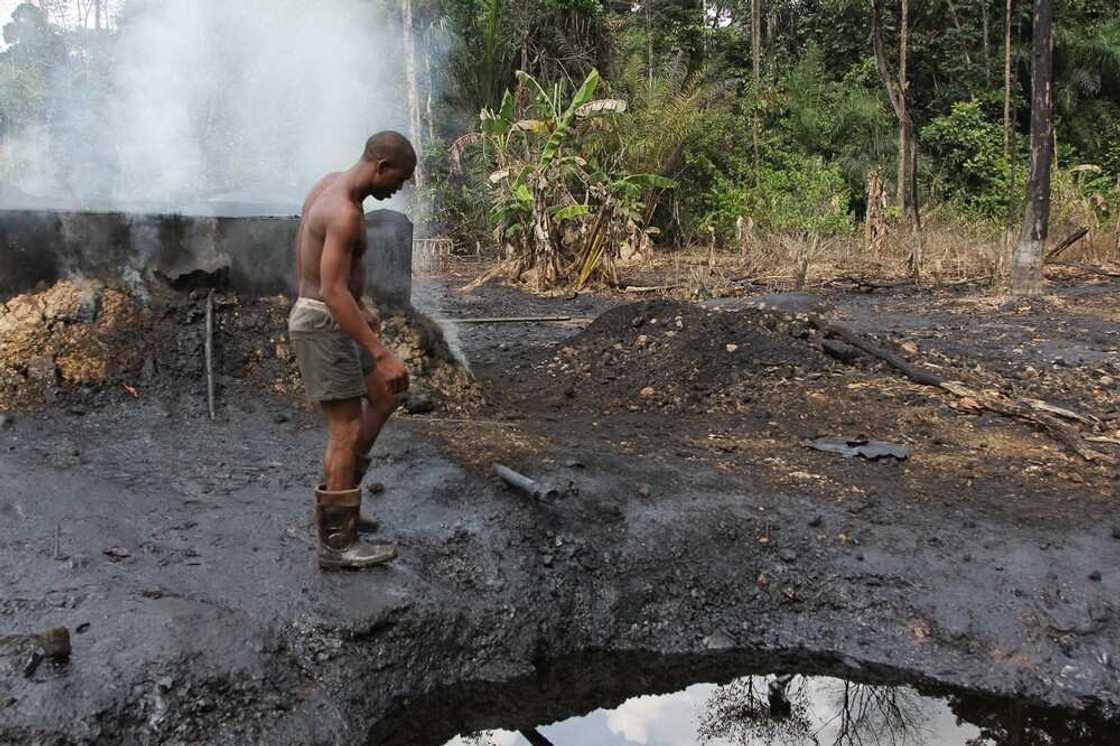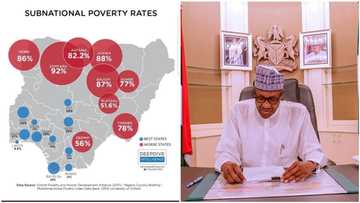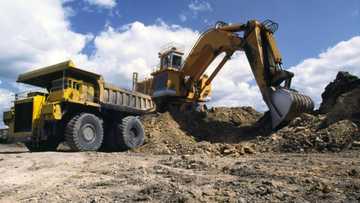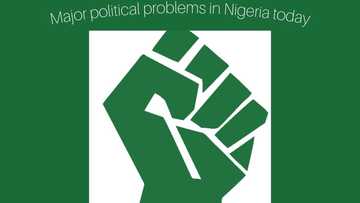OPINION: Ending oil theft in Nigeria by Goodness Adaoyiche and Jerrywright Ukwu
Editor's note: New media journalists based in Abuja, Goodness Adaoyiche and Jerrywright Ukwu, write about the seemingly unending oil theft in Nigeria, especially as the country is still hopelessly dependent on crude oil which makes up about 90% of its export earnings, and more than 60% of the federal government revenue.
Read below:
PAY ATTENTION: Click “See First” under the “Following” tab to see Legit.ng News on your Facebook News Feed!
The menace of oil theft is as old as the discovery of crude in the small town of Oloibiri, Bayelsa state, in 1956. Every year, Nigeria loses billions of naira, that should have been used for infrastructural development, to illegal exploration and exportation of crude oil by national and multinational corporations.
In its report, the Nigerian Extractive Industry Transparency Initiative (NEITI), revealed that for 2012, 2013, 2014, and 2015, a total of $9.89 billion worth of crude oil was lost due to inadequate measurement/metering of oil produced. Within the same period, about 106,861,842 million barrels of oil were not adequately accounted for. It is sad to note that this gross leakage/theft continues to date.
The report further stated that Nigeria loses an average of $11 million daily, $349 million in a month and about $4.2 billion annually to crude and product losses arising from stealing, process lapses and pipeline vandalism.

Source: Facebook
In August 2019, Edo state governor and chairman of the Ad-hoc committee of the National Economic Council on Crude Oil Theft, Godwin Obaseki, disclosed that Nigeria lost about 22 million barrels of its crude oil production to theft between January and June of the same year.
This deprives the Nigerian government and the people of funds needed for infrastructural development; and also inhibits foreign direct investment.
How did we get here?
A major factor that has fueled this blind stealing is opaqueness with which oil deals are made. The lack of transparency and accountability has left the sector vulnerable to so many bad dealings and illicit financial transactions resulting in a huge loss of revenues for the Nigerian government.
The extractive industry's weak governance and regulatory frameworks allow oil and gas companies, as well as other major players in the sector, operate in an unaccountable manner, abuse human rights, partake in illicit financial flows and exploit many oil-producing communities.
The situation is worsened by multinational oil companies that operate in Nigeria without duly being registered by law and who exploit Nigeria's fragile and corrupt context, and weak regulatory framework to perpetuate their illegality, evade tax obligations, cause environmental pollution with zero accountability to the Nigerian people.
A major loophole in tackling this problem is that those existing laws that should deter people from violating seem inadequate. For instance, a violator may be asked to pay as little as N25, N250 and N2500 for a huge crime in the petroleum sector.
The high rate of unemployment in the Niger Delta region has led most youth in the region to turn to illicit hydrocarbon sale as a source of income. Oil bunkering is also a regular sight in the region.
For instance, OML26, located in Delta state with two oil-producing fields in Ogini and Isoko. Its equity is shared 55:45 per cent between the Nigerian Petroleum Development Company Limited (NPDC) and First Hydrocarbon Nigeria Limited (FHN) respectively. A technical partner, Asset Management Team (AMT), is managing it on behalf of the NPDC.
According to a report on Vanguard, about 400,000 to 450,000 barrels of crude was lost at the asset between June and September 2019, to the thieves who carry out their bunkering operations every day "even in the full glare of a military formation" stationed near their scene of operation.

Read also
List of states with high poverty rate as Buhari promises to close gap between rich and poor (infographics)
Efforts with little gains
Past and present governments have continued to put in place measures towards mitigating this problem. One of these steps is setting up security posts close to oil installations in the region. Security personnel posted to these formations have been accused of conniving with oil bunkers and shadow multinational oil corporations to steal products.
Furthermore, the eight National Assembly, under the leadership of the Senate President Bukola Saraki and Speaker Yakubu Dogara, passed a part of the Petroleum Industry Governance Bill (PIGB) in 2018. The bill seeks to promote best practices in the management of the extraction of Nigeria’s oil. Sad to note that President Muhammadu Buhari rejected the bill.
According to Nigeria's Attorney-General and Minister of Justice, Abubakar Malami, President Buhari had declined assent to the PIGB and it was rejected "because the interests of the host community were compromised."
With weak law enforcement, lack of accountability and unemployment in the Niger Delta region, Nigeria's petroleum sector continues to suffer as players in the extractive industry illegally sell this natural resource with zero accountability to the people.
The way forward
Experts have recommended some actions that should be taken with a view to ending crude oil theft in Nigeria. First is the passage of all parts of the PIGB by the National Assembly and subsequent assent to the document by the president.
A report by Connected Development (CODE) and OXFAM, after a series of engagements with stakeholders and visits to some communities in the oil-rich Nigeria Delta region as part of its 'Conflict and Fragility Project,' revealed that passage of the PIGB would enhance accountability and transparency in the petroleum sector.
"The PIGB-proposed NPRC - Nigeria Petroleum Regulatory Commission (a merged agency from PPPRA & DPR) has overly extensive regulatory and enforcement powers in the sector. It is poised as the paramount regulatory agency in environmental standards and enforcement in the oil and gas sector. This would lead to a conflict of interest and would also undermine environmental standards at the altar of its other major regulatory and enforcement functions in the sector. This power would be better and properly exercised by NOSDRA, under the ministry of environment. Hence, the PIG Bill must be reconsidered and altered in light of this," the report said.
The CODE/OXFAM report also urged President Buhari to sign the amended NOSDRA bill into law in order to enhance its autonomy, funding in purchasing vital equipment, capacity building, detecting and remediating oil spill; and execution of other core statutory mandates. The penalties "fines" in the NOSDRA Act - under S. 6(2)/(3) for oil spill reporting and clean up/remediation thereof should be increased sufficiently to act as an adequate deterrent and enhancement of duty of care in their oil and gas operations. Also, NOSDRA should explicitly have powers to sue oil companies violating environmental standards, regulations and laws in their operations.
The Company and Allied Matters Act (CAMA) and other relevant regulatory enactments should be amended to include core provisions from the UN Guiding Principles on Business and Human rights, especially as it relates to the environment, public health and rights of the people in extractive communities. A breach of which should warrant sanctions, perhaps, revocation of license "deregistration," etc, by the CAC, DPR and/or NOSDRA.
The Corporate Affairs Commission (CAC) and other relevant regulatory bodies should develop/enhance adequate mechanisms for detecting and penalizing foreign companies not registered in Nigeria, but which operates in Nigeria in contravention to S. 54(1) of the CAMA. The penalty "fine" for contravention of S.54(1) of the CAMA (registration of foreign companies in Nigeria) should be sufficiently increased to act as a deterrent.
More so, it should include confiscation of assets and other relevant measures. Presently, the fine for the violating company is N2,500 only! While its officers are liable for N250 only, and a N25 daily fine for continued violation. Furthermore, currently, Beneficial Ownership Register obligations under CAMA (Ss. 94-98) are limited to public companies. This should be made to include private companies. Most oil and gas companies in Nigeria are private companies. This is necessary for transparency and accountability.
Anti-graft agencies like the Economic and Financial Crimes Commission (EFCC), Independent Corrupt Practices and other Offences Commission (ICPC) and Nigerian Financial Intelligence Unit (NFIU) must intensify their efforts in investigating and prosecuting oil companies that are involved in graft practices.
At the international level, oil theft can be addressed through a sincere multi-stakeholder partnership involving companies, governments, and industry groups.
It's important to strengthen regulations to end oil theft, illicit financial flow in the extractive industry, environmental degradation and beneficial ownership.
The provision and enforcement by the Department of Petroleum Resources (DPR) of oil metering infrastructure and technologies at the point of production through the value chain will curb oil leakages and theft.
Community policing may also be very effective in curbing oil theft and mitigating the involvement of the military/Joint taskforce in oil theft.
PAY ATTENTION: Download our mobile app to enjoy the latest news update
The federal government and development agencies should look at democratising access to credit and loans for women and youth to support their economic activities. This would address the unemployment problem in the region.
Also, oil communities must take a proactive step towards prohibiting oil theft, bunkering and pipeline vandalism, and illegal oil refining that contribute to oil spill and environmental degradation. This can be achieved through frequent stakeholder engagements and sensitisation; and a community-based pipeline/facility protection engagement.
The need for oil resources and revenues to be redirected to work for the people and the environment protected cannot be overemphasized. A system where oil-producing communities lack basic amenities like access to clean potable water, schools, roads and hospitals is totally unacceptable. To this end, citizens must demand far-reaching changes to the way the oil and gas industry is managed.
The current system needs a complete overhaul to address the existing incentives structures that promote corruption, mismanagement and inefficiency.
Your own opinion articles are welcome at info@corp.legit.ng— drop an email telling us what you want to write about and why. More details in Legit.ng’s step-by-step guide for guest contributors.
Contact us if you have any feedback, suggestions, complaints or compliments. We are also available on Twitter.
Gas Flare Curse: 'Our men are becoming impotent' | Legit TV
Source: Legit.ng








